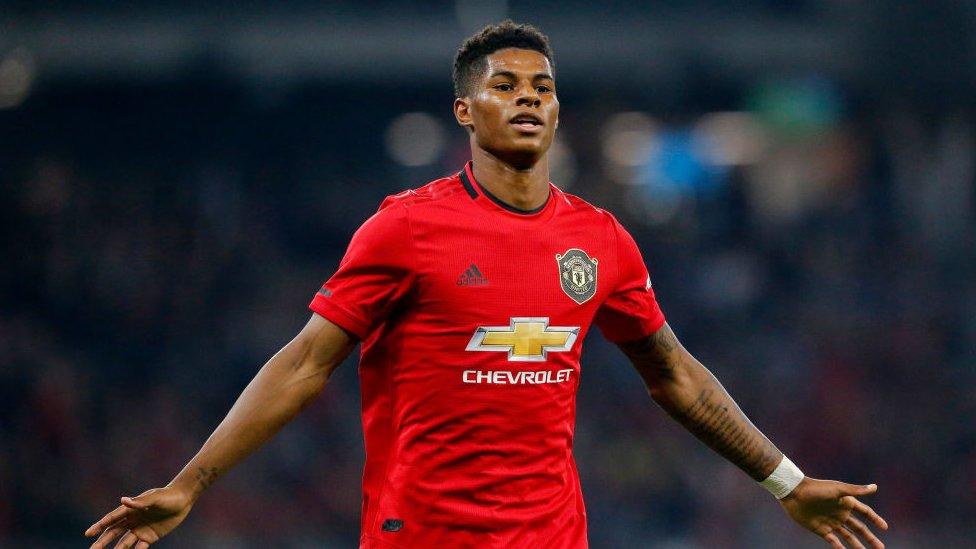Marcus Rashford forces government U-turn after food voucher campaign
- Published
- comments

The government has changed its mind and will continue a food voucher scheme in England during the summer holidays, following a campaign by Manchester United and England footballer Marcus Rashford.
The Covid summer school fund will mean that children eligible for free school meals in term time will get a six-week voucher.
After the government announced the change, Rashford tweeted: "I don't even know what to say. Just look at what we can do when we come together, THIS is England in 2020."
Prime Minister Boris Johnson said he was glad of Marcus Rashford's "contribution to the debate around poverty".
The Manchester United forward had asked the government to change its mind about not offering vouchers for free meals during the summer holidays.
The Department for Education had previously said the government would not change its decision.
Writing in a newspaper article on Tuesday before the government's decision, Rashford said: "Today I focus on a trophy that stands for something much bigger than football.
"In this case, the trophy is combating child poverty.
"I don't claim to have the education of an MP in parliament, but I do have a social education. I am clued up on the difference a U-turn decision would make on the 1.3 million vulnerable children across the UK who are registered for free school meals because 10 years ago I was one of them."
London's mayor, Sadiq Khan, wrote on Twitter: "I might be a Londoner and Liverpool fan, but I fully support Man Utd's Marcus Rashford.
"As a child I benefited from free school meals. The government must extend its free school meal scheme for disadvantaged children over the summer holidays. (And his mum should be very proud.)"
Man United's Marcus Rashford speaks about his tough upbringing in bid to end food poverty
Rashford has already raised £20m this year with the charity FareShare and on Monday shared his own experiences growing up in a letter to MPs (Members of Parliament) where he talked about the sacrifices his mum made while bringing him up.
"My story to get here is all-too-familiar for families in England: my mum worked full-time, earning minimum wage to make sure we always had a good evening meal on the table. But it was not enough. The system was not built for families like mine to succeed, regardless of how hard my mum worked."
Rashford's letter was praised by several politicians as well as teachers and others working in education who had asked the government to listen to him.
We have done what is right... the wellbeing of our children should ALWAYS be a priority
Following the government's change of heart, he posted a statement on social media saying he was "proud" of what had been achieved.
"There is still a long way to go but I am thankful to you all that we have given these families just one less thing to worry about tonight. The wellbeing of our children should ALWAYS be a priority."
What is the voucher scheme?
The voucher scheme began in England in March to help families that struggled to afford meals while schools were closed due to the coronavirus lockdown.
More than one million children are eligible for the vouchers, which are worth £15 for families having to buy food.
The scheme, which has already cost more than £129m, ran throughout Easter and May half-term holidays, but the new 'Covid summer school fund' of about £120m is being set up by the government to help feed children during the summer holidays.
In Wales, the devolved government has already committed to providing free school meals over the summer holidays.
Free meal vouchers will also continue in Scotland during the holidays.
For the families that are eligible they have been given either an electronic voucher or gift card worth £15 each week, to spend at supermarkets.
But the system has had problems including schools struggling to log on, parents being unable to download vouchers and some saying they failed when they tried to use them to pay for items.
- Published15 June 2020
- Published15 June 2020
